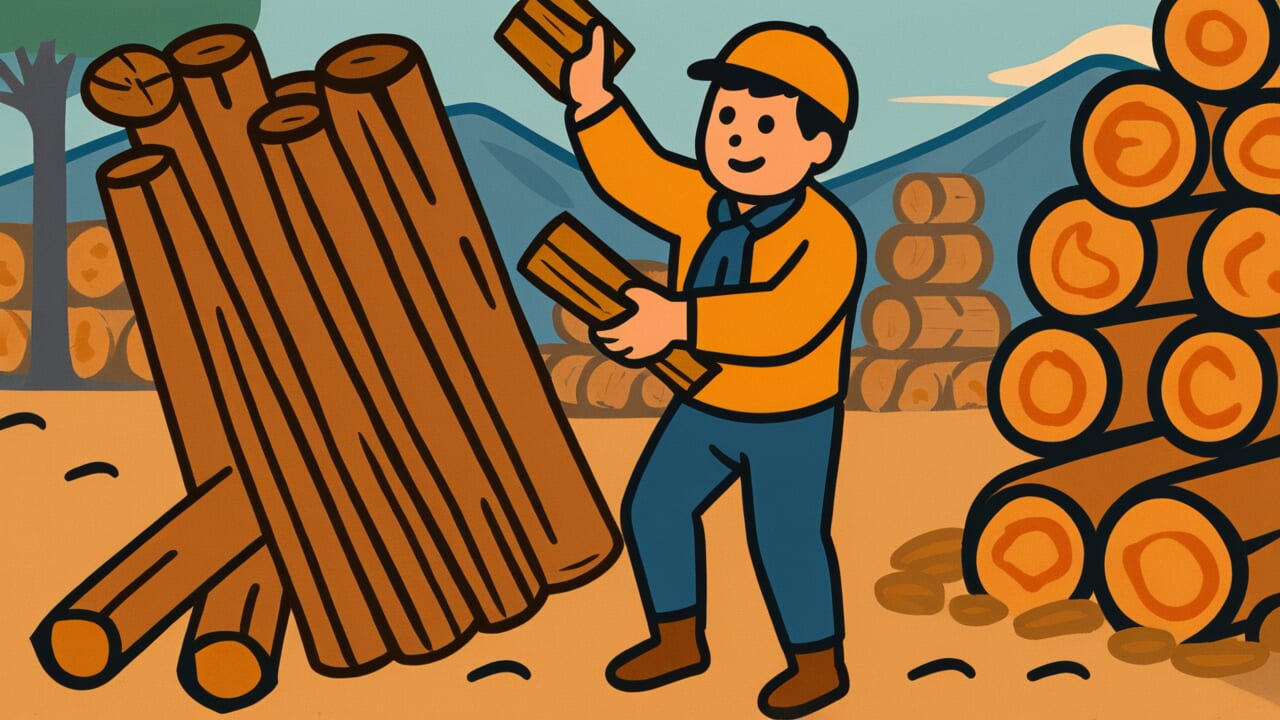How to Read “Like stacking firewood, those who come later are on top”
Takigi wo tsumu ga gotoku nochi ni kuru mono ue ni ari
Meaning of “Like stacking firewood, those who come later are on top”
This proverb describes a phenomenon where those who arrive later rise above those who came first.
In organizations and groups, it refers to situations where people who join later achieve higher positions or recognition than their seniors.
This saying is used in merit-based environments or when talented newcomers rapidly distinguish themselves.
For example, it applies when a junior colleague gets promoted first, or when a student surpasses their teacher’s abilities.
The reason for using this expression is that the concrete image of stacking firewood makes the abstract concept of status reversal easy to understand.
In modern times, the seniority system has weakened, and society now values ability and results more.
Therefore, the situation this proverb describes happens more frequently than before.
This saying succinctly expresses the reality that those who start first don’t necessarily stay on top.
Origin and Etymology
Clear documentary records about the origin of this proverb are limited, but we can make interesting observations from the structure of the phrase.
Let’s focus on the act of “stacking firewood.”
When you stack firewood, the pieces you place first end up at the bottom, and later pieces pile on top.
This is a physical necessity, a scene everyone witnessed in daily life.
Especially in times when firewood was essential for living, this stacking pattern was a very familiar observation for people.
The brilliance of this proverb lies in overlaying this natural phenomenon with reversals of hierarchy and status in human society.
Those who come first don’t necessarily stay in higher positions, and those who come later can rise to the top.
The proverb expresses this irony and social reality through the everyday material of firewood.
During the Edo period, within the class system and organizations, the phenomenon of juniors overtaking seniors through ability or luck must have been a topic of interest.
This expression likely emerged from such social observations.
By using the concrete image of firewood, it successfully conveyed complex changes in human relationships in a form anyone could understand.
We can feel the wisdom of our ancestors in this proverb.
Usage Examples
- The new employee became department head in just three years—truly “like stacking firewood, those who come later are on top”
- When my younger brother married first and inherited the family home, I really felt “like stacking firewood, those who come later are on top”
Universal Wisdom
Behind the continued transmission of this proverb lies a fundamental truth about human society.
That truth is that chronological order and ability or status don’t necessarily align.
People instinctively expect a hierarchy where “those who came first are on top.”
Respect for elders and seniors is a universal value seen in many cultures.
However, in actual society, this expectation is frequently betrayed by talent, effort, luck, and changing times.
When those who come later overtake their predecessors, complex emotions swirl.
The anxiety of the forerunner, the pride of the latecomer, the surprise of onlookers.
This proverb was born from a keen eye observing such subtleties in human relationships.
By choosing the everyday material of firewood, it successfully expresses reversals that anyone might experience from a neutral perspective—neither criticism nor praise.
Human society is always fluid.
There’s no guarantee that today’s superior will remain superior tomorrow, nor that today’s subordinate will stay subordinate.
This uncertainty is what makes life unpredictable and interesting.
Our ancestors brilliantly captured this truth through the simple metaphor of stacking firewood.
When AI Hears This
When you observe the act of stacking firewood, extremely unique information processing is actually occurring.
Normally in nature, things become more disordered as time passes.
Milk poured into coffee mixes on its own but never unmixes. This is the law of increasing entropy.
However, in firewood stacking, later pieces going on top creates a structure where the time axis and position are reversed.
In other words, a system is created where “old information is buried in lower layers, and new information occupies the surface”—opposite to nature.
What’s interesting is that maintaining this structure requires continuous energy input.
Without the physical work of lifting and stacking firewood, this reversed structure cannot exist.
The phenomenon of juniors overtaking seniors in human society is the same—it only happens when energy is invested through education costs and institutional design.
If left naturally alone, the thermodynamically stable state is for those who came first to remain advantaged.
What this proverb may actually be warning about is “the cost of maintaining order.”
A system that places those who come later on top is an unstable structure that constantly consumes energy.
That’s precisely why people viewed this phenomenon as special and preserved it in words.
Organizational renewal isn’t a naturally occurring phenomenon but an artificial order that must be intentionally created.
Lessons for Today
This proverb warns us against overconfidence in “starting first.”
Whether in careers or learning, starting early doesn’t guarantee permanent advantage.
Those who come later may observe your trial and error and find more efficient methods.
This isn’t a pessimistic lesson at all.
Rather, it teaches us the necessity of continuous learning and growth.
Don’t rest on being a pioneer—maintain the humility to learn from the fresh perspectives and innovative approaches of latecomers.
At the same time, this is a message of hope for those who start late.
You don’t need to give up just because you started behind.
Through concentration, efficiency, and utilizing the wisdom of predecessors, overtaking is entirely possible.
In modern society, the speed of change is accelerating.
We live in an era where yesterday’s common sense becomes today’s nonsense.
That’s why we need an attitude of doing our best from this very moment, without obsessing over chronological order.
Your value isn’t determined by when you started, but by what you’re doing now.



Comments